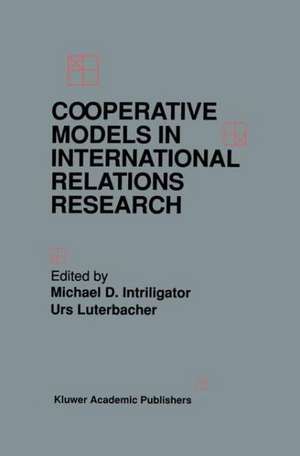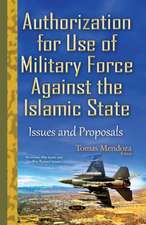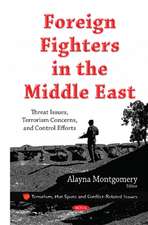Cooperative Models in International Relations Research
Editat de Michael D. Intriligator, Urs Luterbacheren Limba Engleză Paperback – 20 oct 2012
| Toate formatele și edițiile | Preț | Express |
|---|---|---|
| Paperback (1) | 949.42 lei 6-8 săpt. | |
| Springer Us – 20 oct 2012 | 949.42 lei 6-8 săpt. | |
| Hardback (1) | 955.56 lei 6-8 săpt. | |
| Springer Us – 29 iun 1994 | 955.56 lei 6-8 săpt. |
Preț: 949.42 lei
Preț vechi: 1157.82 lei
-18% Nou
Puncte Express: 1424
Preț estimativ în valută:
181.69€ • 197.29$ • 152.62£
181.69€ • 197.29$ • 152.62£
Carte tipărită la comandă
Livrare economică 22 aprilie-06 mai
Preluare comenzi: 021 569.72.76
Specificații
ISBN-13: 9781461362067
ISBN-10: 1461362067
Pagini: 400
Ilustrații: IX, 385 p.
Dimensiuni: 155 x 235 x 21 mm
Greutate: 0.56 kg
Ediția:Softcover reprint of the original 1st ed. 1994
Editura: Springer Us
Colecția Springer
Locul publicării:New York, NY, United States
ISBN-10: 1461362067
Pagini: 400
Ilustrații: IX, 385 p.
Dimensiuni: 155 x 235 x 21 mm
Greutate: 0.56 kg
Ediția:Softcover reprint of the original 1st ed. 1994
Editura: Springer Us
Colecția Springer
Locul publicării:New York, NY, United States
Public țintă
ResearchDescriere
Cooperative Models in International Relations Michael D. Intriligator and Urs Luterbacher Cooperation problems in international relations research have been asso ciated with a variety of approaches. Game theoretical and rational-choice perspectives have been used extensively to analyze international conflict at a bilateral two-actor level. Problems of deterrence and conflict escalation and deterrence maintaining and conflict dilemma-solving strategies have been studied with a variety ofgame theoretical constructs. These range from two by-two games in normal form (Axelrod, 1984) to sequential games. It is obvi ous that the analysis of conflict-solving strategies and metastrategies deals implicitly and some times explicitly with cooperation. ! The emphasis on cooperation-promoting strategies plays therefore an important role within rational-choice analysis of two-actor problems. However, problems ofinternational cooperation have also been tradition ally associated with literary and qualitative approaches. This is especially true for studies carried out at a multilateral or systemic level ofanalysis. The association between cooperation problems at the international level and the study of international organizations influenced by the international legal tradition have certainly contributed to this state of affairs. The concept of international regime ofcooperation (Krasner, 1983), which derives itselffrom legal studies, has been developed entirely within the context of this literary 1 2 COOPERATIVE MODELS IN INTERNATIONAL RELATIONS RESEARCH conception. However, as such studies evolved, various authors tended to use more formal constructs to justify their conclusions and to refine their analy ses.
Cuprins
Introduction: Cooperative Models in International Relations; M.D. Intriligator, U. Luterbacher. Part 1: Game Theory and Cooperation: General Aspects. 1. Sources in Game Theory for International Relations Specialists; B. O'Neill. 2. On Coalition Games; M. Shubik. 3. From Conflict to Cooperation in the Study of International Security; M.D. Intriligator. 4. A Theory of Cooperation in the Triad; U. Luterbacher. Part 2: Game Theory and Cooperation: Specific Applications. 5. International Cooperation among Relative Gains Maximizers; D. Snidal. 6. The Problem of Absolute and Relative Gains in International Relations Theory; R. Powell. 7. Implementation through Sequential Unanimity Games; J. Green, J.-J. Laffont. Part 3: Deterrence. 8. Rational Deterrence in an Imperfect World; B. Nalebuff. 9. A Question of Procedure at the Vienna Arms Talks; B. O'Neill. Part 4: Escalation and Crises. 10. Limited Nuclear Options and the Dynamics of Escalation; R. Powell. 11. Signaling Difficulties with Linkage in Crisis Bargaining; J.D. Morrow. 12. Are Crises Rational? A Game-Theoretic Analysis; S.J. Brams, D.M. Kilgour. Part 5: Other Approaches to Modeling International Cooperation. 13. The Origin of Games: a Theory of the Formation of Ordinal Preferences and Games; V.K. Aggarwal, P. Allan. 14. An Economic Analysis of Cooperation in the European Community; S. Weber, H. Wiesmeth. 15. Labor Relations in International Comparison,or Why Humans (and Nations) Sometimes Cooperate and Sometimes Don't; J.-C. Lambelet. Index.










